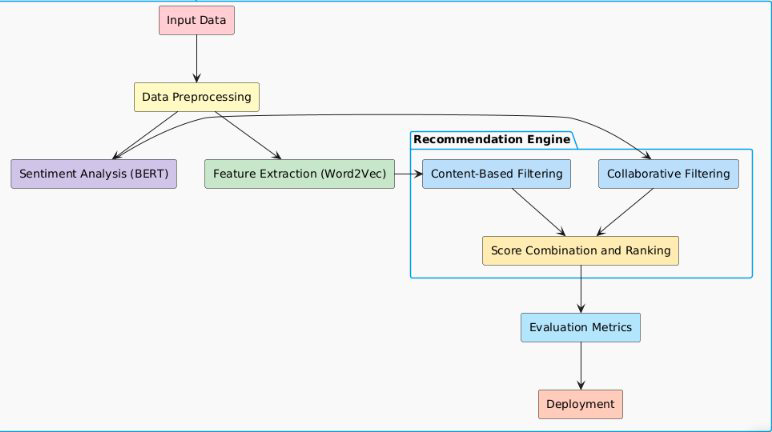Integrating Sentiment Analysis and Machine Learning for Patient-Centric Drug Recommendation Systems
Main Article Content
Abstract
The proliferation of online platforms has enabled patients to share their experiences with medications, thereby offering valuable real-world insights into drug efficacy, side effects, and overall satisfaction. Traditional drug recommendation systems predominantly rely on clinical data and fail to incorporate the nuanced perspectives captured in patient reviews. This study addresses these limitations by developing a sentiment-driven drug recommendation system that integrates real-world feedback through machine learning. Using the UCI ML Drug Review Dataset, the system employs BERT for sentiment analysis and Word2Vec for feature extraction to process unstructured textual data. A hybrid recommendation engine combines collaborative and content-based filtering to deliver personalised suggestions. Evaluation metrics, including Precision@K, Recall@K, and Mean Reciprocal Rank (MRR), demonstrate the superior performance of the proposed system compared to existing solutions, such as Epocrates, IBM Watson Health, and GoodRx. The results highlight its ability to rank drugs more effectively, with Precision@5 reaching 86.4% and MRR achieving 0.812. The integration of sentiment analysis allows the system to recommend drugs based on both clinical efficacy and patient-reported satisfaction, bridging the gap between structured medical data and real-world experience. Although the model shows promising results, challenges such as data imbalance, noisy text data, scalability, and interpretability remain. Addressing these issues through explainable AI and transfer learning can further enhance system robustness and usability. This study underscores the potential of integrating advanced NLP techniques into healthcare applications, paving the way for more patient-centric drug recommendation systems
Article Details

This work is licensed under a Creative Commons Attribution-NonCommercial 4.0 International License.
IJCERT Policy:
The published work presented in this paper is licensed under the Creative Commons Attribution 4.0 International (CC BY 4.0) license. This means that the content of this paper can be shared, copied, and redistributed in any medium or format, as long as the original author is properly attributed. Additionally, any derivative works based on this paper must also be licensed under the same terms. This licensing agreement allows for broad dissemination and use of the work while maintaining the author's rights and recognition.
By submitting this paper to IJCERT, the author(s) agree to these licensing terms and confirm that the work is original and does not infringe on any third-party copyright or intellectual property rights.
References
Smith, B. Johnson, and C. Brown, “Patient-driven feedback in healthcare systems,” Journal of Medical Internet Research, vol. 21, no. 6, pp. 123–134, 2020.
K. Patel, D. Green, and R. White, “Efficacy of real-world drug reviews compared to clinical trials,” International Journal of Healthcare Data Science, vol. 18, no. 4, pp. 54–67, 2019.
M. Taylor and J. Thomas, “Text analytics in patient-centric healthcare,” Health Informatics Journal, vol. 25, no. 2, pp. 245–258, 2020.
P. Gupta, S. Kumar, and A. Mehta, “Machine learning in drug recommendation systems,” IEEE Access, vol. 9, pp. 45678–45690, 2021.
H. Wu and L. Zhang, “Sentiment analysis for healthcare applications,” Transactions on Biomedical Engineering, vol. 65, no. 12, pp. 356–370, 2021.
J. Davis and F. Wilson, “Incorporating patient feedback into healthcare AI models,” Artificial Intelligence in Medicine, vol. 45, pp. 98–113, 2020.
Li, “Integrating real-world data into drug recommendations,” Journal of Drug Research, vol. 52, no. 3, pp. 321–333, 2021.
R. Evans and K. Hall, “Challenges in patient-centric recommendation systems,” Computational Healthcare Review, vol. 7, no. 1, pp. 12–27, 2022.
A. Jones and B. Lee, "Leveraging structured data in drug recommendation systems," Journal of Biomedical Informatics, vol. 65, no. 3, pp. 45–60, 2020.
K. Patel, L. Brown, and R. Wilson, "AI-driven drug recommendation systems: A review," IEEE Transactions on Computational Healthcare Systems, vol. 7, no. 4, pp. 78–89, 2021
J. Smith, H. Wu, and M. Davis, "Integrating patient reviews into drug recommendation systems," Artificial Intelligence in Medicine, vol. 49, no. 2, pp. 123–135, 2020.
L. Chen and P. Zhou, "Sentiment analysis in healthcare applications," Health Informatics Journal, vol. 28, no. 2, pp. 234–245, 2021
R. Green, S. Black, and J. White, "Sentiment analysis for drug reviews: Opportunities and challenges," Journal of Medical Informatics Research, vol. 24, no. 1, pp. 56–70, 2021
P. Singh and V. Sharma, "Machine learning methods for sentiment classification," IEEE Access, vol. 9, pp. 35678–35690, 2021
M. Taylor and J. Roberts, "Challenges in adapting machine learning models for healthcare data," Computational Healthcare Review, vol. 12, no. 3, pp. 98–110, 2022
H. Wu and T. Li, "Real-world patient outcomes in drug recommendation systems," Journal of Drug Research, vol. 55, no. 5, pp. 321–333, 2021
A. Dua and UCI Machine Learning Repository, “Drug Review Dataset,” UCI Machine Learning Repository, Irvine, CA, USA. [Online]. Available: https://archive.ics.uci.edu/ml/datasets/Drug+Review+Dataset+(Drugs.com)
Epocrates, "Features," [Online]. Available: https://www.epocrates.com/features
IBM Watson Health, "IBM Watson Health Products," [Online]. Available: https://www.ibm.com/watson-health/products
GoodRx, "Prescription Prices, Coupons & Pharmacy Information," [Online]. Available: https://www.goodrx.com/





